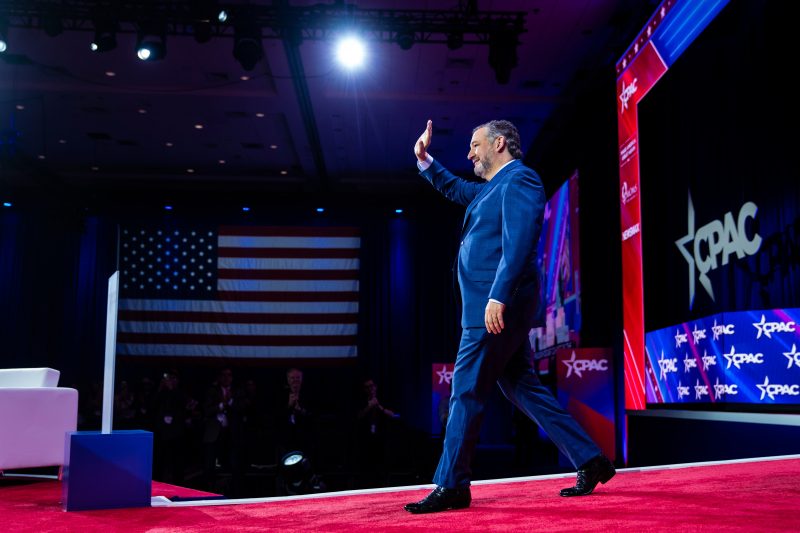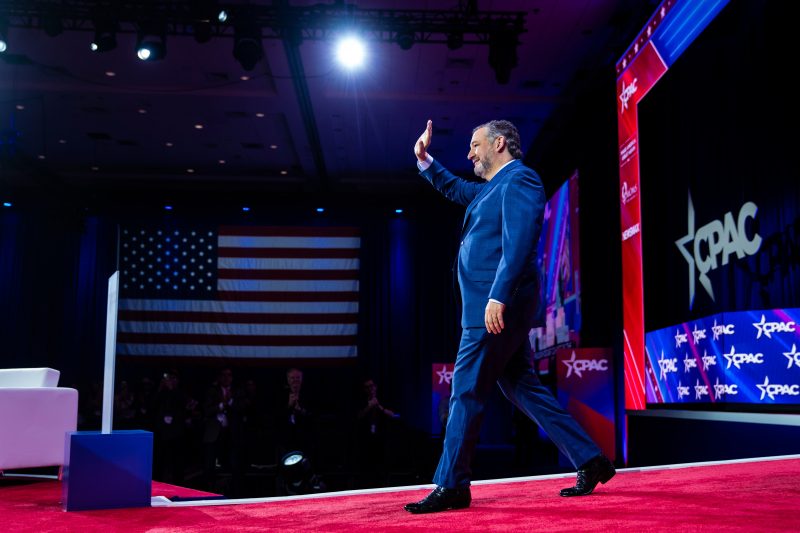
Sen. Ted Cruz (R-Tex.) and his allies are mobilizing to prevent a repeat of his near-miss reelection race in 2018 that shook up politics in traditionally red Texas.
The Club for Growth, an influential conservative group, told The Washington Post on Wednesday it will spend at least $10 million to defend Cruz against the newly minted Democratic nominee, Colin Allred.
The group — and other Cruz boosters — are working to tie the Dallas-area congressman to President Biden, who remains deeply unpopular in Texas.
“Club for Growth Action has been strongly behind Sen. Ted Cruz since he was first elected, and we plan to spend 8 figures in his race against Biden’s MVP Rep. Colin Allred,” the group’s president, David McIntosh, said in a statement that nodded to Allred’s background as a former National Football League player.
In 2018, Cruz defeated Democrat Beto O’Rourke by less than three percentage points, a surprisingly tight margin that came after Cruz and his allies, some critics said, were slow to respond to O’Rourke’s emergence as a national Democratic darling. The Club for Growth did not start seriously spending in the race until late that summer.
Allred is also taking lessons from 2018. His supporters see him as a more disciplined campaigner who has already shown in the primary he can take the fight to Cruz.
O’Rourke’s freewheeling campaign energized many Texas Democrats but left room for ample second-guessing after he came up short, especially about his decision to avoid attacking Cruz until the end.
“We’re going to build on the campaigns of the past,” Allred said in an interview Wednesday. But, he added, “I’m a different candidate, and it’s a different time, and we have different challenges.”
The political environment also differs from 2018. Democrats are hoping to benefit from the higher turnout in a presidential election year, and Texas is now one of their best pickup opportunities in the Senate as they mostly play defense in other battleground states.
Allred has already outraised Cruz, and his campaign had almost $2 million more cash on hand than Cruz’s did as of mid-February. Allred easily won his primary Tuesday, getting nearly 60 percent of the vote against eight other Democrats.
Both candidates spent the hours after polls closed reaching out to the political middle.
In his victory speech, Allred criticized Cruz for “12 years of pitting us against each other,” while Cruz launched a “Democrats for Cruz” coalition Wednesday morning, suggesting some in the party have become disillusioned with “radical leftist[s]” like Allred.
The Club for Growth’s opening salvo — a 90-second digital ad — also casts Allred as too liberal for Texas and shows him repeatedly praising Biden. Allred downplayed the role of Biden in the race, saying it will be about “Texans talking to Texans,” and promised to be an “independent voice” in the Senate.
It is not just the Club for Growth that is ramping up its efforts well ahead of Election Day. A pro-Cruz super PAC, Truth and Courage, has already raised more than $2 million for the race and has focused on opposition research, field organizing and communications.
The Cruz campaign also made clear Wednesday it’s taking the race seriously. Campaign spokesperson Sam Cooper said in a statement that Cruz’s team “has been building an aggressive campaign to get out the vote across the state with a robust grassroots operation, an offensive digital strategy, and a broad base of coalitions.”
The stakes are high in Texas, where 2018 showed that even a close statewide race could have major implications down-ballot. While Cruz edged out O’Rourke, Democrats flipped two U.S. House seats in Texas — including one that Allred won — as well as 14 seats in the state legislature.
The race also gave Texas Democrats a desperately needed star, and O’Rourke went on to run for president in 2020 and governor in 2022.
Gilberto Hinojosa, chair of the Texas Democratic Party, said Allred’s general-election campaign “is going to be substantially different than what Beto had run.” Hinojosa said Allred is running as more of a moderate, can connect better with communities of color as a Black man and understands Democrats “really need to go where the big concentrations of votes are.”
O’Rourke famously barnstormed all 254 counties in Texas, and while Hinojosa stressed that rural outreach is important, he said any candidates needs to be realistic with their time.
Wendy Davis, the 2014 Democratic nominee for Texas governor, described Allred’s approach as “steady, measured, disciplined.”
“I think Beto — and I, in my statewide race in 2014 — would both willingly talk about lessons learned, and the importance of message discipline, of strategic discipline, and that’s what I see in Colin,” Davis said. “He knows the path. He is staying the course.”
That was on display in the primary, in which Allred unapologetically campaigned on bipartisanship despite attacks from his closest competitor, Roland Gutierrez. They clashed most sharply after Allred broke with his party in January and supported a GOP-backed House resolution condemning Biden’s “open-borders policies.”
Gutierrez told Allred at a debate he was throwing their party’s president “under the bus … just for political expediency.” Even O’Rourke criticized Allred’s vote.
“That was a tough vote for me,” Allred said at the debate. But, he added, “it was a vote that I saw as being about whether we stood for the status quo or not.”
The border will be a major issue in the general election as Texas voters continue to rank it as their highest priority in polling — and Gov. Greg Abbott (R) keeps pushing the envelope with his policies.
Allred’s supporters say he is well-positioned to draw a contrast with Cruz on the issue while also maintaining some distance from national Democrats. Earlier this year, Allred backed the bipartisan Senate border security deal that Cruz bashed and former president Donald Trump helped scuttle.
“I’m a progressive Democrat from the border, a Latina, and I recognize that if we’re going to have to get anything done, it has to be done in a bipartisan way,” said Rep. Veronica Escobar (D-Tex.), an early Allred supporter who opposed the anti-Biden resolution. “I know that was a tough vote for Colin … but I think Colin has always been his own man, his own person, and he will continue to be that way as a United States senator.”

